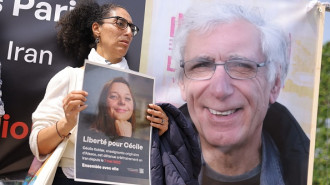Priti shocking: Britain among top citizenship rights abusers, second only to Bahrain
Britain has stripped more people of their citizenship in the last 22 years than any country in the world besides Bahrain, according to a new report.
Published last week, 'Instrumentalising Citizenship In The Fight Against Terrorism' documented 212 cases of citizenship deprivation by the UK from 2000 onwards.
Bahrain tops the global rankings with 434 cases; the UAE comes third at 60, and then Belgium with 52.
The 40-page report, from the Institute on Statelessness and Inclusion and the Global Citizenship Observatory, concluded that the removal of citizenship became more widespread in the wake of the 9/11 terror attacks.
Several countries in Europe and the Middle East and North Africa region significantly expanded grounds to implement the controversial measure.
Laura van Waas, an author of the report from the Institute on Statelessness and Inclusion, told The New Arab that stripping people of their citizenship has gone from an “unacceptable” measure in the late 20th century to a “surprisingly prevalent” state tactic today.
“The increase in use shows the clear impact of ‘global fight against terrorism’ narratives,” she said.
Since 9/11, nationality deprivation laws have been introduced or expanded in 1 in 5 countries, in many cases to remove citizenship to purportedly counter terrorism or protect nationality security, the report said.
Three distinctive trends were highlighted in the document: firstly, there are countries that have expanded their laws and use this to strip more people of citizenship, like Bahrain and Britain.
Secondly, there are countries that have expanded laws - particularly following the rise of the IS group in Syria and Iraq - but refrained from using them, such as Azerbaijan and Uzbekistan. The report argues this is because these states decided to focus on integration and rehabilitation.
Thirdly, there are nations that have limited deprivation powers, most notably Canada.
"Increasing citizenship deprivation [over the last 22 years] is not universal," said van Waas. But ultimately, “it is a faulty premise.
"There are a lot of questions about its effectiveness.”
The report said that removing citizenship has a “corrosive effect” on fundamental rights and ultimately serves to undermine the ethos of global cooperation and collaboration.
Focusing specifically on the UK, van Waas said citizenship deprivation - such as in the case of Shamima Begum - has been seen as a “symbolic cleansing of the community” that leads to “people’s dehumanisation”.
UK legislation since 2002 evolved to expand the government’s citizenship deprivation powers and entrench the view that 'citizenship is a privilege, not a right', the report said.
This includes allowing the deprivation to take immediate effect (introduced in 2004) and enabling its use on someone who will be left stateless (2014). The UK government’s Nationality and Borders Bill is presented in the report as an extension of this worrying trend.
“It is really concerning,” said van Waas. “It means the government can take this evasive and permanent measure" without notifying an individual first.
The Borders Bill has suffered several defeats in the House of Lords and is currently stalled in the House of Commons.
It has been vehemently criticised by refugee and rights groups for punishing vulnerable families and creating a culture of hostility in Britain’s migration system.
Amnesty International, for example, called the clause to extend citizenship deprivation a "sinister power".
On an optimistic note, van Waas added that the bill was making people take notice of “how far we’ve come in this measure as a whole”. However, she added that collecting data was "really challenging" and these figures from across the world could misrepresent the full extent of what is happening.
The UK Home Office released a statement in March 2022 clarifying that “removing someone’s British citizenship…is used against those who obtained citizenship by fraud and against dangerous people”.
Dangerous people are categorised as those who threaten national security by committing espionage or acts of terrorism; people who display unacceptable behaviour such as the glorification of terrorism; or are involved in war crimes or serious organised crime.
The New Arab contacted the Home Office for comment.
“Our priority is to ensure the safety and security of the UK," they responded. "Deprivation of citizenship is used against those who have acquired citizenship by fraud and against the most dangerous people."
“Deprivation of citizenship only happens after very careful consideration of the facts and in accordance with international law. Each case is assessed individually on its own merits and always comes with the right of appeal.”





 Follow the Middle East's top stories in English at The New Arab on Google News
Follow the Middle East's top stories in English at The New Arab on Google News

![The law could be enforced against teachers without prior notice [Getty]](/sites/default/files/styles/image_330x185/public/2178740715.jpeg?h=a5f2f23a&itok=xMdFOAIF)
